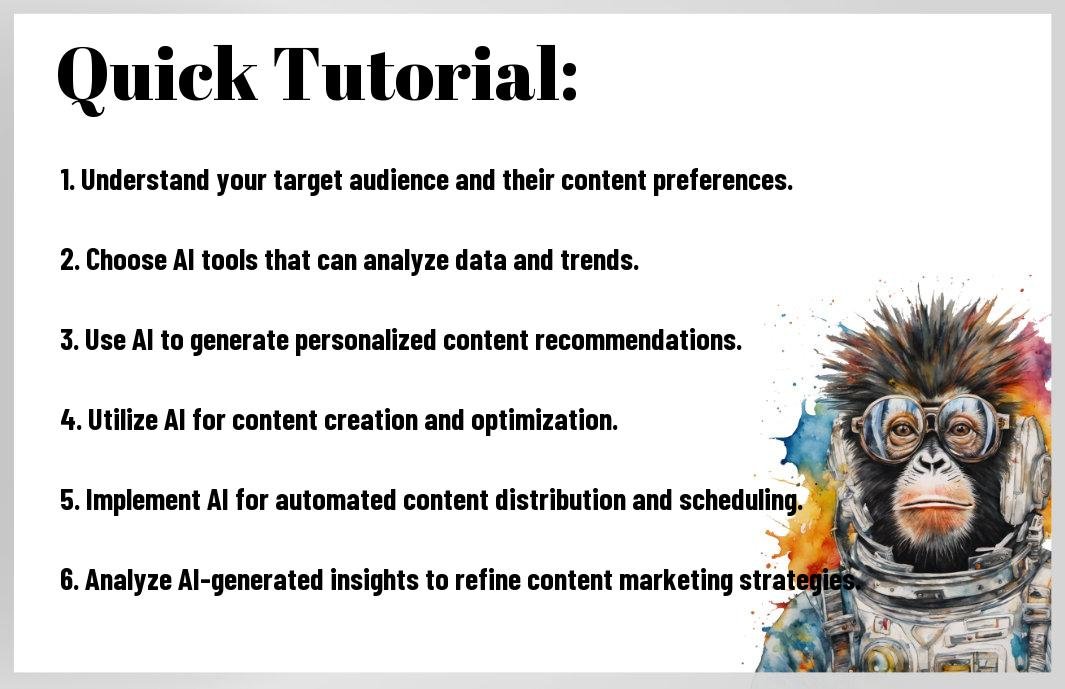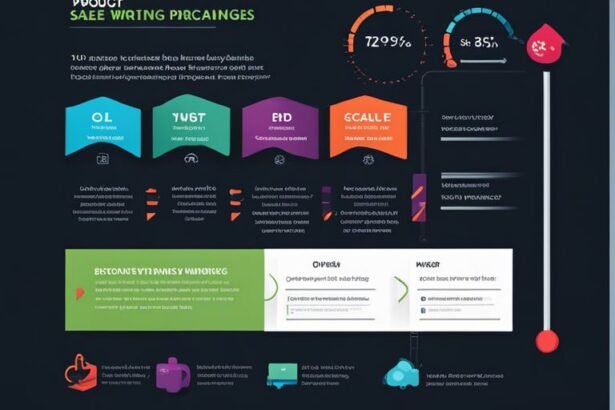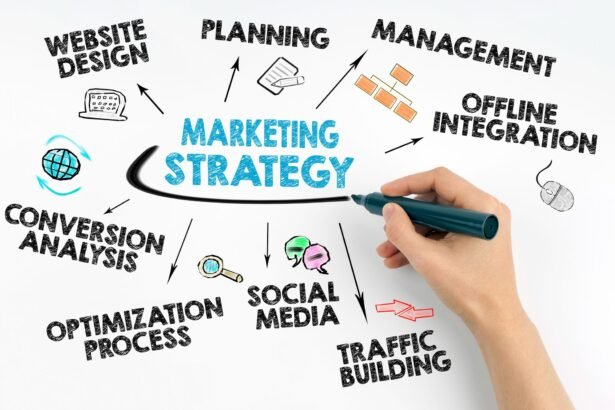Utilizing artificial intelligence (AI) tools can significantly enhance a small business’s content marketing strategy. With the right AI tools, small businesses can streamline their content creation process, gain valuable insights into their target audience, and increase the effectiveness of their marketing efforts. In this top 10 listicle, we will explore the various AI tools that can help small businesses create, distribute, and optimize their content for maximum impact and engagement.
Key Takeaways:
- AI tools can help small businesses optimize content strategy: By using AI tools, small businesses can analyze data, identify trends, and optimize their content strategy to reach their target audience more effectively.
- Personalizing content with AI: Small businesses can leverage AI tools to create personalized content based on user behavior, interests, and preferences, leading to better engagement and conversion rates.
- Improving content creation with AI: AI tools can help small businesses generate ideas, automate content creation, and optimize content for SEO, making the process more efficient and impactful.
- Enhancing content distribution and promotion: Small businesses can use AI tools to improve their content distribution and promotion strategies by identifying the best channels, times, and formats to reach their target audience.
- Measuring and optimizing content performance: AI tools can provide insights into content performance, analyze key metrics, and make data-driven recommendations for optimizing future content marketing efforts.

Understand AI Basics
To effectively leverage AI tools for content marketing, it is crucial for small businesses to understand the basic concepts of artificial intelligence. AI refers to the simulation of human intelligence processes by machines, especially computer systems. This includes learning, reasoning, and self-correction. In the context of content marketing, AI tools can be used to analyze data, automate tasks, and personalize content for target audiences.
Define AI needs
For small businesses looking to leverage AI for content marketing, it is essential to first define their specific AI needs. This involves understanding the goals and objectives of the content marketing strategy and identifying the areas where AI can add value. Whether it’s improving content personalization, optimizing SEO strategies, or automating content creation, defining AI needs will help in selecting the right tools and solutions.
Understand different AI tools offer various capabilities such as natural language processing, predictive analytics, and sentiment analysis. By researching and exploring the available AI tools, small businesses can identify the ones that align with their content marketing objectives and budget constraints. It is important to consider factors such as ease of implementation, scalability, and compatibility with existing systems when selecting AI tools for content marketing.

Identify Target Audience
If small businesses want to effectively leverage AI tools for content marketing, the first step is to identify their target audience. This involves analyzing customer data and creating personas to better understand the needs and preferences of their potential customers.
Analyze customer data
The key to successful content marketing lies in understanding the target audience. The use of AI tools can help small businesses analyze customer data more efficiently and effectively, providing valuable insights into the behavior, demographics, and preferences of their audience. This data can then be used to create personalized and targeted content that resonates with the audience, ultimately leading to higher engagement and conversion rates.
Create personas
Create personas which are fictional characters representing your ideal customers, based on real data and market research. Any small business can benefit from developing personas as it can help align content with the interests and needs of the target audience. These personas can then be used as a guide for creating content that is tailored to the specific needs, preferences, and pain points of different segments of the target audience.
Select Relevant Tools
For small businesses looking to leverage AI tools for effective content marketing, it is essential to select the right tools that align with their goals and resources. These tools can help streamline processes, improve content quality, and enhance overall marketing effectiveness. To learn more about AI for Small Business Marketing, check out the AI for Small Business Marketing: Strategies, Tools, and ….
Content creation tools
One of the key challenges for small businesses in content marketing is creating compelling and relevant content on a consistent basis. AI-powered content creation tools offer solutions for generating engaging content, automating content production, and optimizing it for search engines. These tools can help businesses enhance their content strategy, save time, and produce high-quality content that resonates with their target audience.
Additionally, AI-powered content creation tools can analyze data from various sources to understand trends, consumer behavior, and preferences, allowing small businesses to tailor their content to meet the specific needs of their audience. By leveraging these tools, businesses can stay ahead of the competition and connect with their audience on a deeper level.
Analytics tools
Any effective content marketing strategy requires data-driven insights to measure the performance of content, understand audience engagement, and make informed decisions for future content creation. AI-powered analytics tools provide small businesses with advanced capabilities to track and analyze key metrics, such as website traffic, user behavior, and content performance. These tools can uncover valuable insights that help businesses refine their content strategy, optimize their content for better results, and ultimately drive more conversions.
Content AI analytics tools can also offer predictive analysis, enabling businesses to anticipate market trends, customer needs, and content performance. By harnessing the power of AI-driven analytics, small businesses can make data-backed decisions and continuously improve their content marketing efforts for maximum impact.
Create Content Strategy
Unlike traditional content marketing, leveraging AI tools for effective content marketing starts with creating a well-defined content strategy. This is crucial for small businesses looking to make the most of their resources and maximize the impact of their content efforts.
Define objectives
The first step in creating a content strategy is to clearly define the objectives you aim to achieve through your content marketing efforts. Whether it’s increasing brand awareness, generating leads, or driving website traffic, having specific and measurable goals will guide your content creation and distribution efforts in the right direction. With AI tools, you can analyze market trends, audience behaviors, and competitor strategies to establish realistic objectives that align with your business goals.
Plan content calendar
To ensure consistency and relevance in your content marketing, it’s essential to plan a content calendar that outlines the topics, formats, and distribution channels for your content. This involves understanding the content preferences of your target audience, identifying peak engagement times, and aligning your content with key industry events or seasonal trends. AI tools can assist in content planning by providing insights into content performance metrics, keyword optimization, and predictive analytics to optimize your content calendar for maximum impact.
For instance, AI-powered content scheduling tools can analyze historical data to identify the best times to publish content for maximum reach and engagement. By integrating AI-driven insights into your content calendar, you can ensure that your content is strategically aligned with your audience’s preferences and behaviors, ultimately enhancing the effectiveness of your content marketing efforts.
Implement AI Writing
Your small business can effectively leverage AI tools for content marketing by implementing AI writing. AI writing tools use natural language processing and machine learning algorithms to generate content that is coherent, engaging, and tailored to your target audience. These tools can help your business streamline the content creation process, increase efficiency, and maintain consistency in your brand voice across various channels.
Draft initial content
Writing the initial draft of content can be time-consuming and labor-intensive for small businesses. AI writing tools can assist in generating the first draft of blog posts, social media captions, email newsletters, and website content. These tools can help in brainstorming ideas, structuring content, and even suggesting relevant keywords to improve search engine optimization. By utilizing AI writing tools for drafting initial content, small businesses can save valuable time and focus on other aspects of their content marketing strategy.
Refine with AI
Implementing AI tools to refine the initial content can further enhance the quality and relevance of the content. AI-powered editing and proofreading tools can ensure that the content is free of grammatical errors, typos, and inconsistencies. Additionally, AI tools can analyze the tone, readability, and overall structure of the content to optimize it for maximum impact on the target audience. With AI-powered content refinement, small businesses can enhance the quality of their content while maintaining a consistent brand voice and style.
With AI refining tools, businesses can also leverage sentiment analysis, content personalization, and A/B testing to maximize the effectiveness of their content marketing efforts. These tools can analyze audience behavior, preferences, and trends to tailor the content for better engagement and conversion rates. By refining content with AI, small businesses can stay ahead of competitors and deliver highly targeted and impactful content to their audience.
Use AI for SEO
Keep up with the latest trends in content marketing using AI. For more information, check out How to Use AI for Small Business Marketing (With Examples).
Keyword optimization
With AI tools, small businesses can efficiently identify and target high-performing keywords. By analyzing search trends and user behavior, AI can suggest relevant keywords for inclusion in your content. Additionally, AI can help in optimizing on-page elements such as meta tags, headings, and content structure to improve search engine visibility.
AI-powered keyword optimization tools can also provide insights into long-tail keywords and semantic variations, allowing businesses to create more comprehensive and targeted content that resonates with their audience.
Content analysis
Keyword research is just the beginning. AI enables small businesses to perform in-depth content analysis to understand how well their content performs and how it can be improved. AI tools can analyze factors such as readability, engagement, and relevance, helping businesses fine-tune their content strategy for better SEO results.
The use of AI in content analysis also extends to sentiment analysis and topic modeling, providing businesses with valuable insights into consumer preferences and trending topics within their industry.
Automate Social Media
After creating high-quality content, the next step is to ensure that it reaches your target audience. This is where social media automation comes in. By using AI tools, small businesses can schedule posts and analyze engagement to ensure that their content is being effectively distributed and resonating with their audience.
Schedule posts
For small businesses with limited resources, it can be challenging to consistently maintain a strong social media presence. With AI tools, you can schedule posts in advance across multiple platforms, saving time and ensuring that your content is being shared at optimal times for maximum visibility. This allows you to maintain a consistent online presence without being tied to your computer or phone all day, freeing up time to focus on other aspects of your business.
Analyze engagement
One of the key benefits of leveraging AI tools for social media marketing is the ability to analyze engagement. By using AI-powered analytics, you can gain valuable insights into the performance of your content, including which posts are resonating with your audience, the demographics of your followers, and the best times to post for maximum engagement. This data-driven approach allows you to make informed decisions about your social media strategy, ensuring that your efforts are targeted and effective.
Automate social media, AI tools, schedule posts, analyze engagement, small businesses, content marketing, social media automation, AI-powered analytics, target audience, social media strategy.
Personalize Email Marketing
Nowadays, personalization is key to effective email marketing. With the help of AI tools, small businesses can now leverage data to personalize their email marketing campaigns, leading to higher engagement and conversion rates.
Segment email lists
Marketing automation platforms powered by AI can help small businesses to segment their email lists based on demographic, behavioral, and purchase data. By creating targeted segments, businesses can deliver highly personalized content and offers to their audience, increasing the likelihood of conversion and customer retention.
Tailor content
To further enhance personalization, AI tools can analyze customer behaviors and preferences to tailor email content. By leveraging machine learning algorithms, businesses can predict the type of content that would resonate with each segment of their audience, resulting in higher open and click-through rates.
For instance, by using AI-powered tools, businesses can dynamically insert personalized product recommendations or content based on each subscriber’s browsing history and purchase patterns, creating a truly customized email experience.
Monitor Performance
Despite the initial effort put into creating and implementing a content marketing strategy, the work doesn’t end there. It’s crucial for small businesses to continuously monitor the performance of their content to ensure it’s resonating with the target audience and driving the desired results. Fortunately, AI tools can play a significant role in helping businesses track metrics and adjust their strategy accordingly.
Track Metrics
One of the key advantages of leveraging AI tools for content marketing is the ability to track various metrics in real-time. These tools can provide insightful data on website traffic, user engagement, social media interactions, and conversion rates. By analyzing these metrics, small businesses can gain valuable insights into which pieces of content are performing well and resonating with their audience, and which ones may need improvement. This data-driven approach allows businesses to make informed decisions and optimize their content strategy for better results.
Any successful content marketing strategy is built on the foundation of data-driven decision-making. With AI tools, small businesses can analyze and interpret vast amounts of data to gain a deeper understanding of their audience’s preferences and behavior. By tracking metrics such as click-through rates, bounce rates, and time spent on the website, businesses can make informed adjustments to their content strategy to improve user engagement and drive better results.
Continuous Learning
To effectively leverage AI tools for content marketing, small businesses must embrace continuous learning. It is essential to stay updated with the latest advancements in AI technology and understand how they can be utilized to enhance content marketing strategies. For a comprehensive understanding of how AI can benefit small businesses in their content marketing efforts, check out How AI Can Help Small Businesses: 8 Powerful Use Cases.
Stay updated
To stay ahead in content marketing, small businesses need to stay updated with the latest AI trends and tools. This involves continuously researching and learning about new AI technologies and how they can be applied to optimize content creation, distribution, and analysis. By remaining abreast of industry developments, businesses can ensure that they are making the most out of AI for their content marketing strategies.
Moreover, subscribing to industry newsletters, following thought leaders in AI and content marketing, and actively participating in relevant webinars and workshops can provide valuable insights into the latest AI applications for content marketing. By regularly seeking new knowledge and understanding emerging AI trends, small businesses can stay ahead of the curve and maintain a competitive edge in the digital landscape.
Adapt technologies
To effectively leverage AI tools for content marketing, small businesses must be willing to adapt to new technologies. It is crucial to embrace AI-powered tools and platforms that facilitate content creation, personalization, and performance tracking. By incorporating AI technologies into their content marketing workflows, businesses can streamline processes, enhance audience engagement, and gain actionable insights for continual improvement.
Adaptation to AI technologies also entails optimizing content strategies based on AI-driven analytics and predictive modeling. This involves using AI-powered tools to analyze consumer behavior, preferences, and trends, and then tailoring content efforts accordingly. By adapting to AI technologies, small businesses can harness the power of data-driven decision-making and deliver more impactful content to their target audiences.
Final Words
Drawing together the power of artificial intelligence and content marketing can be a game changer for small businesses. By leveraging AI tools, small businesses can gain valuable insights into customer behaviors, tailor their content to specific target audiences, and automate repetitive tasks, ultimately leading to more effective content marketing strategies. With the right AI tools in place, businesses can stay competitive in the digital landscape and create engaging, relevant content that resonates with their audience. It is important for small businesses to understand the potential of AI in content marketing and to incorporate these tools into their overall marketing strategy in order to stay ahead of the curve and achieve long-term success.
FAQ
Q: Why should small businesses leverage AI tools for content marketing?
A: Small businesses can leverage AI tools for content marketing to increase efficiency, personalize content, and gain insights into customer preferences, ultimately driving better results and maximizing resources.
Q: What are some AI tools that small businesses can use for content marketing?
A: Small businesses can use AI tools such as natural language processing (NLP) for content generation, AI-powered analytics for audience segmentation, and chatbots for customer interaction to enhance their content marketing strategy.
Q: How can AI tools help small businesses create personalized content?
A: AI tools can analyze customer data to understand preferences, behaviors, and demographics, enabling small businesses to create targeted and personalized content that resonates with their audience, leading to higher engagement and conversions.
Q: What are the benefits of using AI tools for content marketing in small businesses?
A: The benefits of using AI tools for content marketing in small businesses include improved content quality, reduced manual effort, data-driven insights, optimized customer experiences, and the ability to compete with larger enterprises on a level playing field.
Q: How can small businesses integrate AI tools into their existing content marketing strategy?
A: Small businesses can seamlessly integrate AI tools into their existing content marketing strategy by identifying specific areas for improvement, leveraging AI solutions that align with their goals, and continuously analyzing and optimizing the performance of AI-powered content initiatives.





